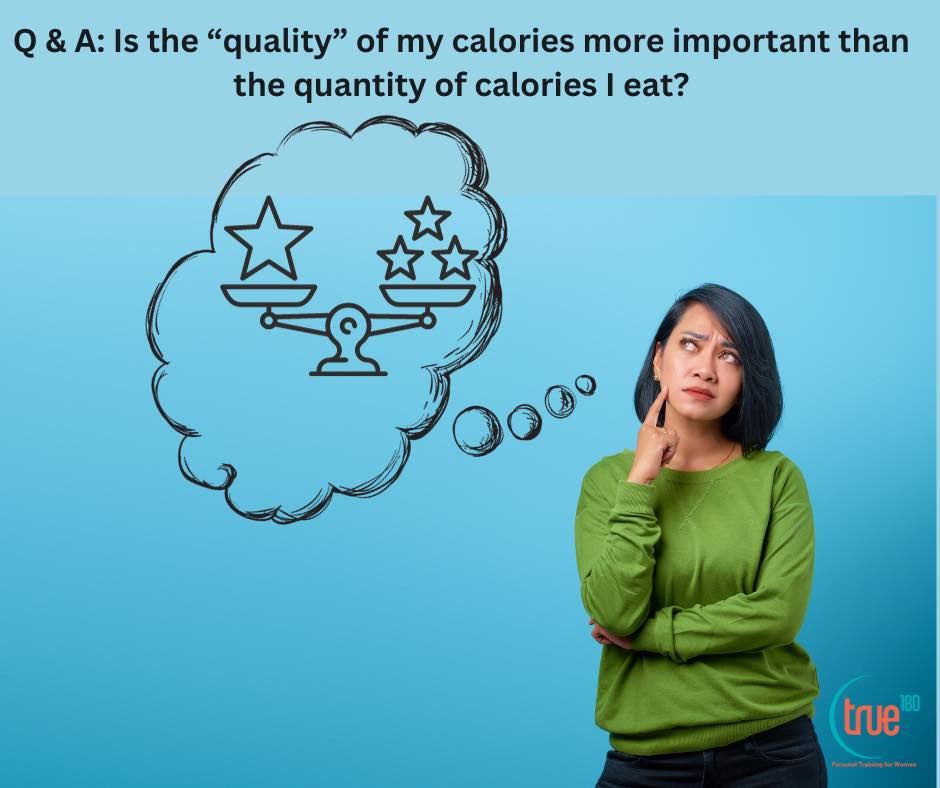Q & A: Is the “quality” of my calories more important than the quantity of calories I eat?
A: The short answer is that the quantity of calories is always the most important thing. Always, not sometimes. (Question was asked in the context of weight loss and/or maintenance.)
Quick background on the question: I was asked about this article that asserts eating “more high-quality calories [will] speed up [your] metabolism”.
Main Myth: Low carbohydrate diets boost your metabolism by 325 calories per day
To quote the article “those who chose fewer carbs and ate more high-quality calories sped up their metabolisms, too, burning an additional 325 calories per day.” This number is from here.
Why the extra 325 calories per day? 2 reasons:
1. Fraud? Researchers from the US, the UK and China have pointed out that the numbers in the above study don’t make sense.
2. That group got 50% more protein than the others.
Fraud? These are the main problems (and plain English translations) the international team of researchers have found just in case you don’t want to wade through the link above:
a. Science: “Reported results were not calculated according to the preregistered statistical analysis plan”
b. English: they changed the way they chose to do the math after the study, and as you’ll see below it sure looks like they did this because they didn’t like the results.
a. Science: “The original preregistered analysis plan did not result in significant diet differences in TEE”
b. English: if you go back and use the original plan from when the study design was approved and funded there is no difference between energy burned. (TEE is total energy expenditure, or total calories your body burns in a day.
a. Science: “Reported diet differences were inflated by inclusion of subjects with implausible unaccounted energy”
b. English: Some people were eating 500+ calories more than they were supposed to. Eating more food means burning more calories in digestion. You can’t, with integrity, equate people eating vastly different amounts of food and then report it as people eating the same amount of food, and then say “quality trumps quantity.”
a. Science: “Daily average CO2 production was not different between diets regardless of analysis plan”
b. English: Using the data the original researchers provided shows bullshit.
i. CO2 (carbon dioxide) production is a measure of how many calories you burn because all the ways our body burns energy results in making some CO2.
ii. RQ is the ratio of carbon dioxide to oxygen that someone exhales. You can use the RQ (which was published) and some arithmetic to figure out how much carbon dioxide the different people’s bodies made, and, therefore how many calories they really burned.
iii. Doing the math from the published data shows no difference. The 325 calorie difference is an illusion, aka bullshit.
50% more protein?
If fraud isn’t enough for you…Digesting protein burns a lot of calories. Protein costs 20-30% of the calories it contains to be digested. By contrast, fat costs almost nothing to digest at 0-3%, and carbs are in the low-middle at 5-10%.
The low fat (LF) group was also the low protein group. The very low carbohydrate (VLC) group got 50% more protein than the LF group. This is not an honest comparison.
Bottom Line
If you boost anyone’s protein intake by 50% they will feel fuller, their digestion will cost more calories, and they will lose less muscle when losing weight. These are 3 excellent reasons to keep an eye on your protein intake!
Oh, and also, stop clicking on clickbait. The reality of weight loss is boring: eat better, watch calories (especially fat calories), and exercise as much as possible.

